#Supes and Bats spoiling everything;
Explore tagged Tumblr posts
Text





#DC;#Comics;#1980s;#Deadshot;#Floyd pls#Oh comon guys! the boys were fighting;#Supes and Bats spoiling everything;
3 notes
·
View notes
Text
On Tragic Backstories (or, giving your character “one bad night”)
There’s a video essay out there by music nerd, Sideways, about how superhero theme music works, and most of the video is about how and why the original Superman theme song sounds the way it does. He then compares it to Batman’s theme song (the Danny Eflman one) and says that Batman’s theme breaks all the established rules of American superheroes.
Where the likes of Superman are heavy on the horns and brass, the “sound of America”, Batman’s theme is warped, jaded, and dangerous, almost as if it was Superman’s theme, if Supe’s theme had “one bad night”.
I mentioned in another post about giving characters agency in their backstories helps a lot in showing the audience who they really are when they’re put in a corner.
Baby Bats didn’t have much of a choice the night his parents got murdered, though he blames himself plenty.
What I mean, though, is situations where your character is unambiguously the person at fault for where they are today, as either the hero or the villain.
So I’m gonna spoil myself here and talk about my deuteragonist in Eternal Night: Dorian.
I’ve already said that he’s based on another OC of mine (about to make his debut in Little Red Dot on AO3!) but in many ways they are very different. They come from different social classes, different family makeups, different motives for why they do what they do, and different relationships with the protagonist and their love interests.
If you ever read both, you’ll see what traits they share.
Dorian’s backstory takes a while to deliver in ENNS, more than half the book. He drops hints here and there, like his actual age, that he’s not of noble birth, and a little bit about his family from when he was mortal.
Other characters also spill a little through their own biases sprinkled through the chapters so by the time Dorian has the chance to monologue his backstory to Elias, the protagonist, it’s an exposition dump you should be hungry for as the reader.
Personally, I think expository monologues are something I’m amazing at, so I won’t spoil the full experience.
What’s important for this post is that Dorian’s backstory is defined by three choices he had to make:
Why he left home
Why he became a vampire
Why he joined the ‘good guy’ coven
Dorian didn’t have much of a choice for leaving home—vampires were not going to take no for an answer—but he had control over who those vampires were abducting. He made sure they only took him. Who he is as a person and what he stands for is concentrated in that one choice: He is a self-sacrificial character who will do anything to save those he loves.
Why he turned defines another aspect of his character: He has unwavering conviction in his beliefs and will do anything to see them through, even if that means he doesn’t survive the process.
And why did he join the good guys? He represents that ‘vampire’ isn’t synonymous with ‘monster’. Or, in other words, “It’s not what you are, it’s what you do that defines you” and at his core, he is kindness.
Dorian’s backstory would have been a lot different if I’d written him as somebody kidnapped in the dead of night, turned by force, and run from his old coven for being too noble.
Still tragic, absolutely, and I’m not hating on characters who are tragic in their passivity and inability to take action in their lives. Not every character can save themselves, or damn themselves.
I love writing characters who did not expect to have to live with the consequences of their actions and Dorian, and his foundational character, pretty much say those exact words in both their books.
Good consequences or bad, one single choice either from necessity, selfishness, desire, impatience, or the best of intentions, can have a cascading effect on a story that tends to read as more realistic than everything going according to plan.
If I’d written Dorian’s backstory as “I surrendered to this evil coven already plotting how I’d take my revenge and become the vampire I am today, and it all worked flawlessly” I don’t think it would make him as sympathetic.
Not to say I hate plotters, either, he’s just not a plotter. Another character in that same book, Gregori, did pretty much exactly that for his own backstory.
But “I surrendered to this coven and had no idea what I signed up for, then saw an opportunity and jumped on it and could not take that choice back” is fitting of who he is as a person. He was someone too soft and simple for this political world he found himself in, who had to adapt or die.
You can cover a lot of ground, particularly in dreaded “exposition monologues” without throwing it into your audience’s faces that you’re “telling” a bunch of information. I didn’t need Dorian to say “these are the three tentpole traits of my character”.
But I do think that if you give characters that kind of agency, you’re giving them the chance to prove who they are when no one’s looking. For Dorian, who had no guarantee his plan would work or that he’d survive its execution, who he was when no one was looking is a man who’d give his all to keep a promise.
—
If you’d like to check out Dorian’s story, check out Eternal Night of the Northern Sky below.
And if you’d like to see the foundational characters that were the basis of my entire writing journey, check out Little Red Dot.
#writing#writeblr#writing a book#writing advice#writing resources#writing tools#writing tips#character development#character design#tragic backstory#Eternal Night of the Northern Sky
39 notes
·
View notes
Note
Any thoughts on Grant Morrison's Action Comics run? Beyond T shirt-and-jeans Superman being great.
That whole run reinvigorated my love of the character.
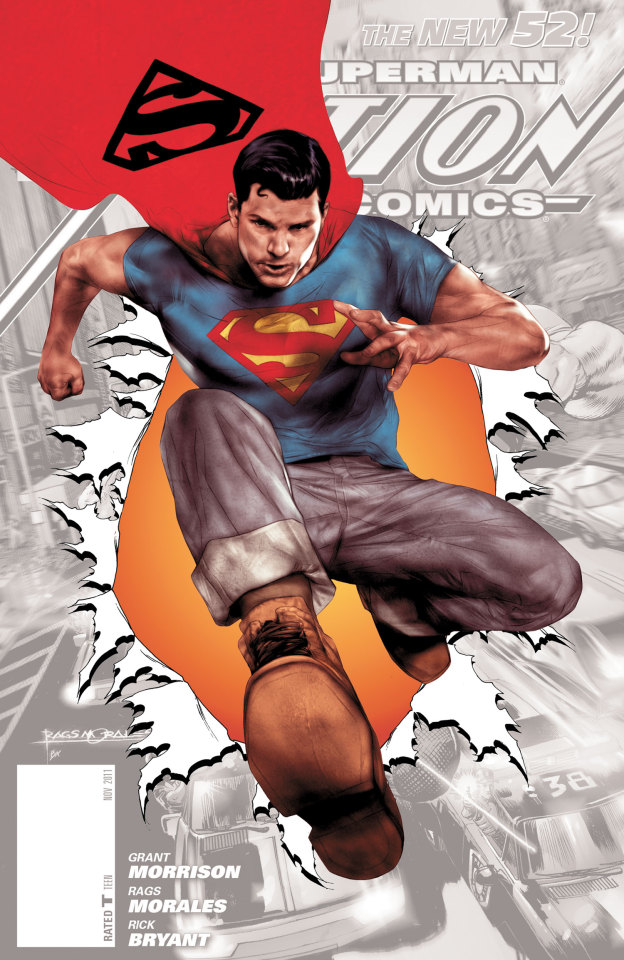
There have been numerous thoughtpieces about New 52 Superman, how he worked and how he didn't but these two entries really do a great job of summing up why Morrison's take on Superman was great. Morrison laid the foundation for a new generational Superman that DC completely fucked up and ran into the ground. I'll always be bitter about that, even if I had tapped out of reading the New 52 Superman books by the end due to how bad they got. Editorial and their idiotic mandates were what screwed over the potential of this take in my eyes.
Now I get that it wasn't to everyone's taste, but I cannot fathom how anyone could ever claim that Pre-Flashpoint Superman was better. If you liked Byrne's reboot better, your guy already got rebooted after Infinite Crisis. For someone like me who really enjoyed the Johns/Busiek era, that era's potential got spoiled after Johns & Busiek left, with New Krypton imploding and the awful Grounded taking it's place. When you get to the point where the best Superman book is the one starring Lex Luthor, it's time to reassess the franchise and figure out where the hell it went wrong.
Which is exactly what Morrison did. For this new Superman, Morrison mined all the best ideas of every Superman era to really give what I consider the ideal "base" for Superman. They also took pains to address common criticisms about Superman, working to correct his pop culture image. People have been complaining that Superman is "too perfect", "too unrelatable" for a long time, so Morrison addressed that. They gave Superman his balls back, and let him reacquire that Golden Age edge he had originally.
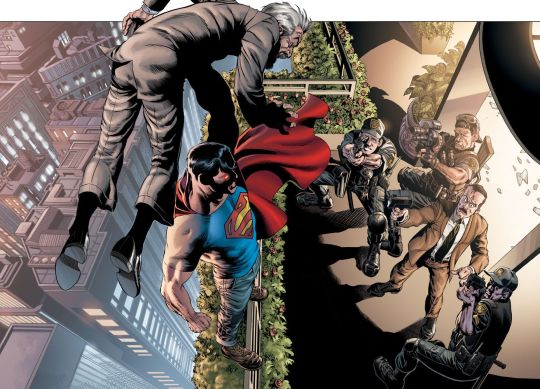
There are a lot of complaints you can make about Morrison's Superman, but I don't see how you could accuse this guy of being "flawless" or "bland". He definitely had a personality that you could describe, love him or hate him. Compassionate, but not a pushover. Clearly holding himself back, but unafraid to occasionally let loose. Flaws that were patently obvious, Clark had a temper here that could get him into trouble. There was a real showcase of anger here, of Superman being furious at the way people were treated by the rich and powerful, then doing something about it that I ate up.
I read this run just as I was coming into my teens and it hit perfectly for where I was in life. Did not want a Superman who would smile and tell me it gets better, I wanted a Superman who looked you in the eye and told you he felt that same anger, and then encouraged you to go out and do something about how you felt. That was what this run delivered in spades, and it expanded what I believed could be done with Superman.
While it totally blew my mind to see Superman acting this way the first time I read Morrison's Action Comics run, in retrospect it really isn't that different from how Superman has acted even under Byrne. One of the few traits I've seen carry across Superman incarnations in the comics is that he has a temper underneath that affable nature. "Don't tug on Superman's cape" as the old song goes. This run simply elevated that to the forefront of the character again, for the better in my eyes given I believe "Wrath" is Superman's Deadly Sin.
In fact, one of the strongest features of this run is that Superman gets actual character development over the course of the run, analogous to what Batman underwent in Morrison's Bat-Epic. While the Bat-Epic was merely Morrison re-canonizing Batman's entire history, and applying a retroactive character development storyline that culminated in Morrison's current Batman work, their Action Comics run had them attempt to craft something similar for Superman from scratch. What that meant was Morrison attempting to draw on the most important traits of every Superman era and incorporate those into this new take. So Superman had the Golden Age temper, compassion for the oppressed, and cockiness. The Silver Age supergenuis, proud scion of Krypton who cherished his Kryptonian nature, member of the Legion of Superheroes, and participant in stories that weren't afraid to get weird. Superman's wrestling with his place in the world, the importance of Clark Kent, and making journalism a key part of the character strike me as all being hallmarks of the Bronze Age. From Post-Crisis we got that Clark views himself as human and loves his adopted parents, considering them as equal to his birth ones.
One of the big frustrations for me with the endless origin stories for Superman, is that so many of them follow a predictable and stale formula where Clark puts on the suit and is essentially ready to go. Doesn't interfere with human affairs, is modest and humble, restrained in usage of his powers, it's like Clark has meta knowledge of what he "should" be, despite that he shouldn't have any foreknowledge of what a "superhero" should look like. He operates the same way at the start as he does in the modern day, and that's really boring to me. This Superman, because of the difference in powers and attitude, operated extremely different from his "present day" incarnation. Dangling Glenmorgan over the edge of a building isn't something a fully powered and mature Superman should do, but it works great to make his early days different and exciting to read about, it makes returning to that era something you can do different storytelling with. This run is the only time where I really cared that Superman is "supposed" to be the first superhero, because figuring out what that means here is a big part of how he develops.

We all know the common complaint that Superman is "too powerful" and that "nothing can hurt him" (funny how Thor never gets hit with those accusations), so Morrison made sure to show that this take on Superman could be beaten even if he could never be defeated. Events conspired to force Clark to use his brains as well as his powers to overcome the challenges in front of him.
Examples include him using his heat vision to fry Lex's equipment and escape the military, using his rocket ship to defeat Brainiac, and rallying the population of Metropolis to banish Vyndktvx. Not to say that Clark never used his brains before to win, but this run was very upfront and in your face about how important Clark's intellect is to triumphing over his foes. Can't take seriously the complaint that Superman is too overpowered when Morrison constantly showcased how even a very powerful Superman could get his shit wrecked by his Rogues.
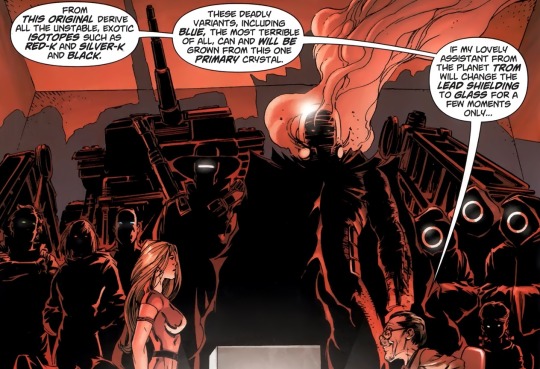
Another example of Morrison addressing criticisms is Kryptonite. A lot of people poke fun at how convenient it is that pieces of Superman's homeworld follow him all the way to Earth. Isn't that a bit of an asspull? So Morrison made Kryptonite the power source of Superman's rocket, giving it a perfectly natural and believable reason both for it to end up on Earth, and for Lex & the military to get a hold of it since Pa Kent gave the military the rocket. That's still my preferred explanation for how Kryptonite ended up on Earth.
It also provides a better explanation for all the different Kryptonite variants. DC can handwave away the different types as a result of Lex experimenting or the different "forces" on Earth such as magic or the Speed Force or whatever creating the different variants. That to me is much more believable than Kryptonite travelling all across the galaxy yet still ending up on Earth somehow.
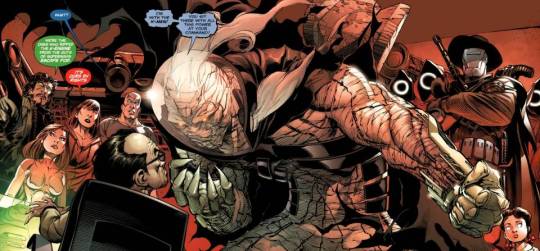
There have also been a lot of complaints about Superman's villains, and Morrison diligently set about reworking them. By far one of my favorite aspects of the run, was the villain revamps. Nimrod felt like a clean revamp of Terra-Man, making him into Superman's Kraven the Hunter struck me as a patently obvious route to go, wild no one has followed up on that or used him since. Metallo felt like a good synthesis of Johns take of him as an Anti-Superman weapon, and the sympathetic aspects of Corben's origin that are always there, I liked that Morrison didn't make him a total bastard before his transformation like Johns did. Brainiac got some sympathy added to him in that the collected worlds that were already marked for damnation, thus he was "saving" them in a fashion. Clay Ramses embodied toxicity as a wife-beater even before becoming Kryptonite Man, and I thought his backstory was a great way for Clark to still deal with "real" issues via a manner he could punch. Ramses is still the best take on Kryptonite Man. Vyndktvx felt like the greatest realization of the threat Mr. Mxyzptlk could pose should he decide to get serious since Whatever Happened to the Man of Tomorrow?, plus I'm a sucker for stories where superheroes fight the Devil. Drekken and Superdoom took the only interesting aspects of Doomsday (his ability to evolve and that he can kill Superman respectively), and were much more interesting characters.
And oh my God, speaking of Superdoom, that part of Morrison's Action run has aged like fine wine. I don't know if they caught wind of DC's plans for the character, or if they were just prescient, but everything that Superdoom is playing on is still sadly all too present. What Superdoom is as a character is a condemnation of what DC keeps doing with Superman: killing him off or making him evil.
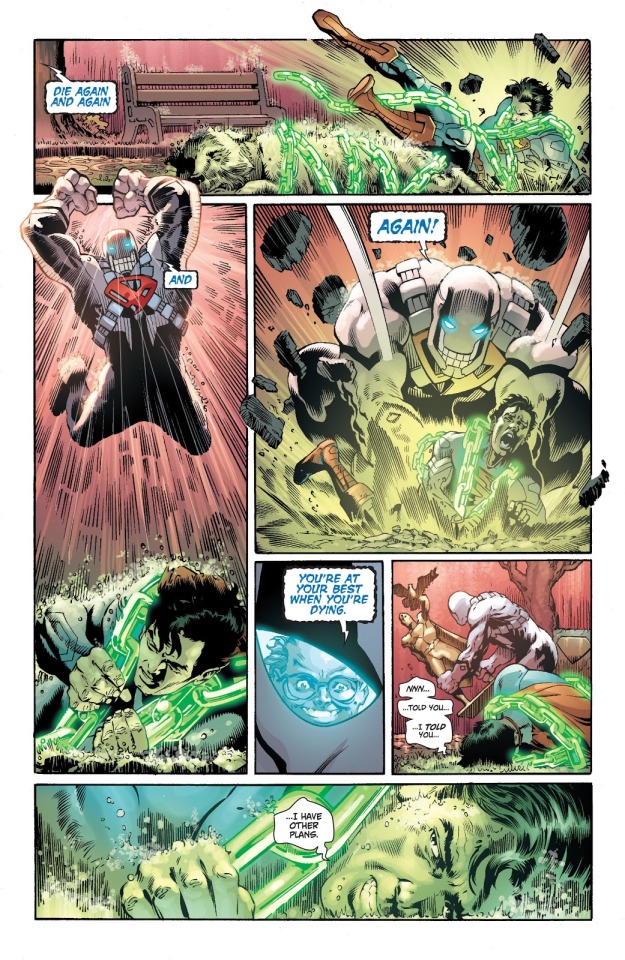
When you realize what Superdoom (demand for a more violent and "realistic" Superman) and Vyn (WB/DC) stand in for, it makes the frustration Morrison is channeling much more palpable. Those two plotlines are all DC can think of to do with the character, returning to those again and again. Endlessly attempting to recapture the high of Batman and Doomsday beating the shit out of Supes in The Dark Knight Returns and Death of Superman. Overcoming these two obstacles is Superman's greatest challenge as conceived by Morrison, because both are out to corrupt and ruin the very idea of him. It's not just a physical death he faces, but a metaphysical one as well. Sadly it's a threat Superman just can't seem to lick in the real world, with more and more takes on "Evil Superman" coming.
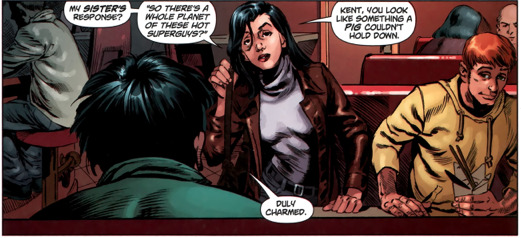
Lois and Jimmy are great here, because Morrison actually made the investigative journalism aspect of Superman important. Lois is an active participant in the story, trying to break in to the base where Clark is being held by her father, competing with Clark for stories (I love how Morrison writes the banter between the two of them), and generally being classic Lois. Jimmy though benefitted from being positioned as a peer rather than as a kid in comparison to the two, something I wish the comics had carried forward. It looks like My Adventures With Superman is going with that interpretation at least, so I hope others do as well. Jimmy being Clark's roommate really adds to their bond, and I wish we had gotten more stories with that status quo.
Investigative reporter Clark Kent was so actively used here that it feels jarring reading other Superman runs where they tend to downplay and ignore it. Following Clark as he travels to different areas of Metropolis and actually interacts with people, instead of hovering above them as Superman, makes him feel human. Watching Clark actively pursue stories aimed at bettering peoples livelihoods, and seeing how those stories crossed with the superheroics, was one of my favorite aspects of the run. It's one unfortunately few other writers seem all that interested in, especially the New 52 writers who followed Morrison (I know editorial probably bears a lot of blame for that though).
Besides all that, this run was a lot of fun! The Legion of Superheroes showed up, their connection to Clark restored, and they got to play a big role in Clark's adventures! Krypto the Superdog! Martian colonies! Memorizing all of medicine, Superman performs a lifesaving operation! Lex using a "bullet train" to knock Clark out! 5-D imps! Rampaging robots from beyond! A Phantom Zone Halloween story! John Henry Irons suits up as Steel and kicks ass alongside Clark! Every Superman Rogue teams up to try to kill him, but Lex Luthor saves his life because that's a privilege he reserves for himself! Showcasing their trademark love for the Supermythos, Morrison took us on a tour of Superlore that demonstrated the depth and width of what could be done with Superman. Meanwhile the backups by Sholly Fisch excelled at giving us smaller, more human stories about Superman (the one where Clark meets Pa again via time travel "after" Pa has died always gives me a lump in my throat to read).
Ultimately this didn't get to be the foundation for the next generation of Superman stories as it deserved. Johns made New 52 Superman the scapegoat in Doomsday Clock for a lot of storytelling choices he did over in Justice League, something that pisses me off to no end. You want to tell me that this guy "didn't relate" to people, didn't inspire "hope"?
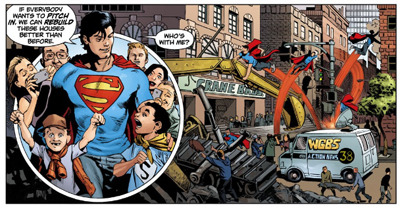
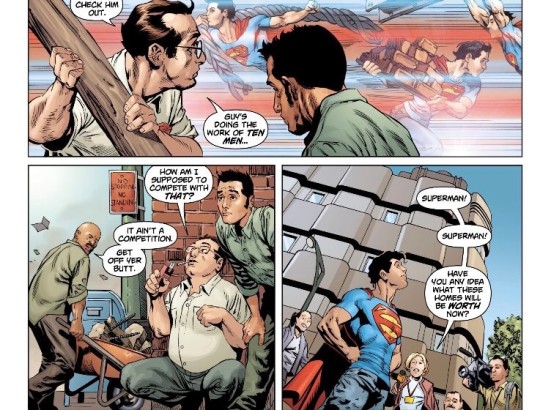
Like hell he didn't. This guy was Superman in every way that mattered and he deserved better than to be framed as the scapegoat for all the stupid decisions DC made about what to do with him. Greg Pak was able to do some great work with this version after Morrison, and just like how Gene Yang got a redemption work starring Superman, I hope to one day see Pak return to the character. Would love to read a Black Label Superman story by Pak that follows his take on young Superman.
All wasn't lost however. Against all odds, and Rebirth trying it's damndest to sweep everything under the rug, it looks like parts of this era have actually survived to the current Infinite Frontier era. With Morrison being heavily involved no less, both as an ideas guy and as an actual writer.
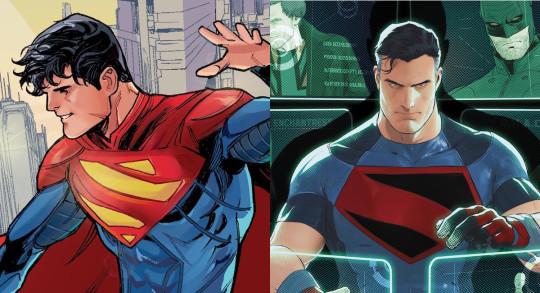
Superman & the Authority is explicitly Superman coming full circle back to the attitude displayed by his young counterpart under Morrison. Janin has outright said that the costume Clark wears here is reminiscent of the t-shirt and jeans era of Superman, and this book so far feels saturated with an energy level from Morrison I haven't seen in their work for hire since they left Action. Reaching old age and realizing he never really delivered on the high ideals of his beginnings, it's Superman putting together a team to hopefully succeed where he couldn't alone. Scathing in how it criticizes the superhero status quo, this has been extremely entertaining to read. Wish Morrison was writing 12 issues with this team, and that ultimately it will be up to PKJ to deliver on the potential is a drawback (although I've loved PKJ's Action run so far), but I'm glad to see DC finally treating Morrison and their ideas with more respect than was shown during Rebirth.
Jon meanwhile feels like an even more explicit attempt at redoing New 52 Superman. There's the updated new suit, designed to appeal to a new generation with it's streamlined look. Positioning Jon as a Superman who wants to tackle the "real" issues, with Taylor explicitly comparing him to Golden Age Superman which as I mentioned was an era Morrison tried to reincorporate into their reboot. There's the Legion of Superheroes connection which played an important role in Morrison's reboot. The rumors about Jon's sexuality are interesting, hinting that DC is willing to go outside the box with him in a way they never would with Clark. I'm excited to see what kind of Superman Jon ends up becoming, if he can deliver on the promise of the New 52 Superman all the better.
This run deserves to be remembered and to have the lessons it tried to teach respected. Probably my favorite mainline run on Superman, I hope more people come around to liking it as time goes on.
21 notes
·
View notes